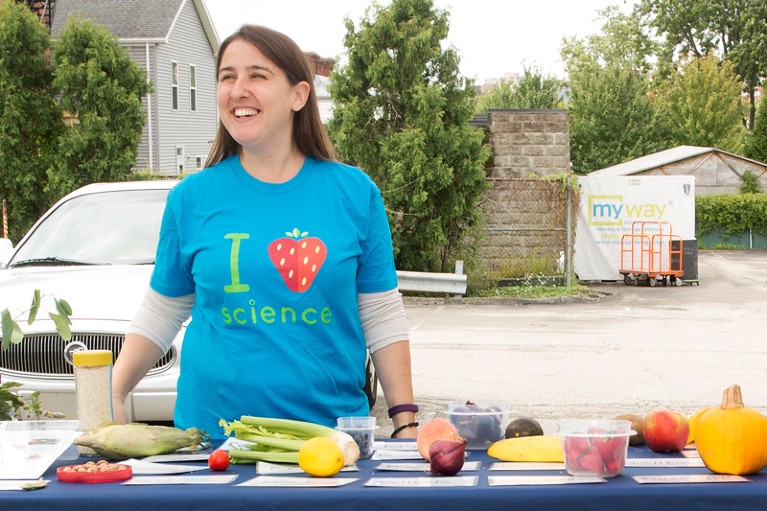
US outreach coordinator Rainee Kaczorowski works with researchers to develop interactive science lessons for high-school students. Credit: Larry Rippel
As a fifth-year PhD student at the University of Pittsburgh, Pennsylvania, I’m considering my next career move. Where better to start than by asking my former lab colleagues? Rainee Kaczorowski worked with my PhD supervisor on a separate project until May 2018. Kaczorowski earned her PhD in 2007 from the University of Missouri in Columbia, where she studied how nectar traits in wild tobacco plants can drive the evolution of different floral species. After that, she spent 11 years continuing to research pollination biology. Now she works with academic researchers to develop lessons for middle- and high-school students.
What inspired you to switch from research to science outreach?
I have always enjoyed doing outreach work. When I came to the University of Pittsburgh, I wanted to ensure that I was as engaged as possible with outreach alongside my postdoc work. My adviser was very supportive. I thought of outreach as being something that I would stay heavily engaged with, but I wasn’t expecting there to be a paid position available. When the role came up, people I worked with mentioned me to the search committee. I think being as engaged as possible before the job became available was crucial for getting this position.
What do you do as an outreach coordinator?
I work with researchers to develop lesson plans for middle- and high-school students, based on current research. I also work with teachers to plan lessons in a way that’s suited to the classroom. We have lesson plans that can run for a single day, and others that last a whole week. Our classes are very interactive. It’s not just a lecture — the students are actually doing research.
What’s an example of a lesson you have developed?
In June, we piloted our five-day urban biodiversity module. The students are learning about the behaviours and scales of ecosystems. We want to convey the idea that in an urban setting, you have all these levels of biodiversity. Students go outside, establish and characterize a plot, and record observations of pollinating animals interacting with flowers. Then they pick a flower from their plot, wash it to collect any microbes, and then transfer drops of the washing solution to an agar plate to grow any bacteria that might be living on the plant. It’s biodiversity at a scale that we typically don’t see, and by plating up bacteria we’re able to visualize the urban ecosystem at that scale.
What research skills are essential for working with teachers and students?
Communication skills are very important. We have workshops for teachers in which we outline our classes. I tell them why we created the lessons, what their students will be doing, and how the content aligns with educational goals. I also want to learn from teachers — how helpful do they think the lesson will be? Are there any changes we should make? And with students, I try to use minimal jargon and talk encouragingly. If they struggle with a concept, I do my best to make sure that it’s not the terminology that is confusing them, and I relate abstract concepts to something more familiar.
What other research skills do you apply?
Being able to troubleshoot. Things that you weren’t expecting are going to come up all the time when you’re in classrooms, and you have to find a way to turn mistakes into teachable moments. For example, in the case of the urban biodiversity project, the students might not see any pollinators. Is it possible that the weather had an impact? We can discuss why pollinators might not be out on rainy days.
What impact do these outreach programmes have on students?
Science outreach helps students to understand how science relates to them and how it applies to their own lives. It encourages them to learn more about the concepts that they find interesting and to explore related careers. In addition, giving students the opportunity to do research gives them skills that are useful beyond scientific investigations, such as critical thinking, hypothesis development, data analysis and communication skills.

 Why we are teaching science wrong, and how to make it right
Why we are teaching science wrong, and how to make it right
 Institutions: Small-school science
Institutions: Small-school science
 University learning: Improve undergraduate science education
University learning: Improve undergraduate science education
 Career change: It’s never too late to switch
Career change: It’s never too late to switch
 From lectures to the lab: three steps to becoming an undergraduate researcher
From lectures to the lab: three steps to becoming an undergraduate researcher







